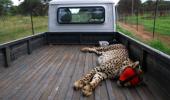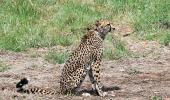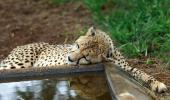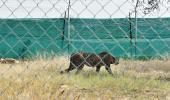The health condition of the fourth and the last surviving cheetah cub at the Kuno National Park (KNP) in Madhya Pradesh, which witnessed the death of its three other siblings earlier this week, is stable, an official said on Friday.

India's ambitious cheetah population revival program suffered a setback after three India-born cheetah cubs died at the KNP this week.
Jwala, earlier known as Siyaya, gave birth to four cubs in the last week of March after being translocated from Namibia in September last year.
"The fourth cub's condition is stable. But it is very difficult to tell about the survival of any (ailing) animal. We are trying hard...," KNP director Uttam Sharma told PTI in response to a query.
Another forest department official blamed the sweltering heat for the death of this cub's three siblings on Tuesday.
When the three cubs died on May 23, the mercury was above 45 degrees Celsius, he said, adding that the cubs were born during the hostile time of the year in terms of temperature.
In Namibia, cheetahs give birth to their offspring at the onset of the rainy season, which is followed by winter there. But Jwala gave birth to the four cubs at the KNP at the onset of summer, he said.
Right now, the weather at the KNP is pleasant due to overnight rains, he added.
One of the four cub's death was reported in the park on May 23. The two other cubs also died on the same day, on Tuesday afternoon, but their deaths were reported only on Thursday.
An official release issued on Thursday said that after the death of the first cub on May 23, the forest department's monitoring team kept an eye on the movements of female cheetah Jwala and her remaining three cubs.
The monitoring team found on May 23 that the condition of her remaining three cubs was not good and decided to rescue them for treatment. The daytime temperature then was around 46-47 degrees Celsius. The cubs were found severely dehydrated. Despite treatment, the two cubs could not be saved, it said.
Apart from the three cheetah cubs, three of the 20 adult cheetahs translocated from South Africa and Namibia have died at the KNP, casting aspersion on the fate of the much-hyped large carnivorous revival programme.
Earlier, Sasha, one of the translocated Namibian cheetahs, died due to a kidney-related ailment on March 27, and another cheetah, Uday, from South Africa, died on April 13.
Daksha, a cheetah brought from South Africa, succumbed to the injuries following a violent interaction with a male during a mating attempt on May 9 this year.
The four cubs of Siyaya/Jwala were the first to be born in the wild on Indian soil after the last cheetah was hunted in Korea district of present-day Chhattisgarh in 1947.
This fastest land animal species was declared extinct in the country in 1952.
Five female and three male cheetahs brought from Namibia were released into enclosures at the KNP at an event attended by Prime Minister Narendra Modi on September 17, 2022.
Another 12 cheetahs were brought from South Africa in February 2023 and housed in a quarantine enclosure.










